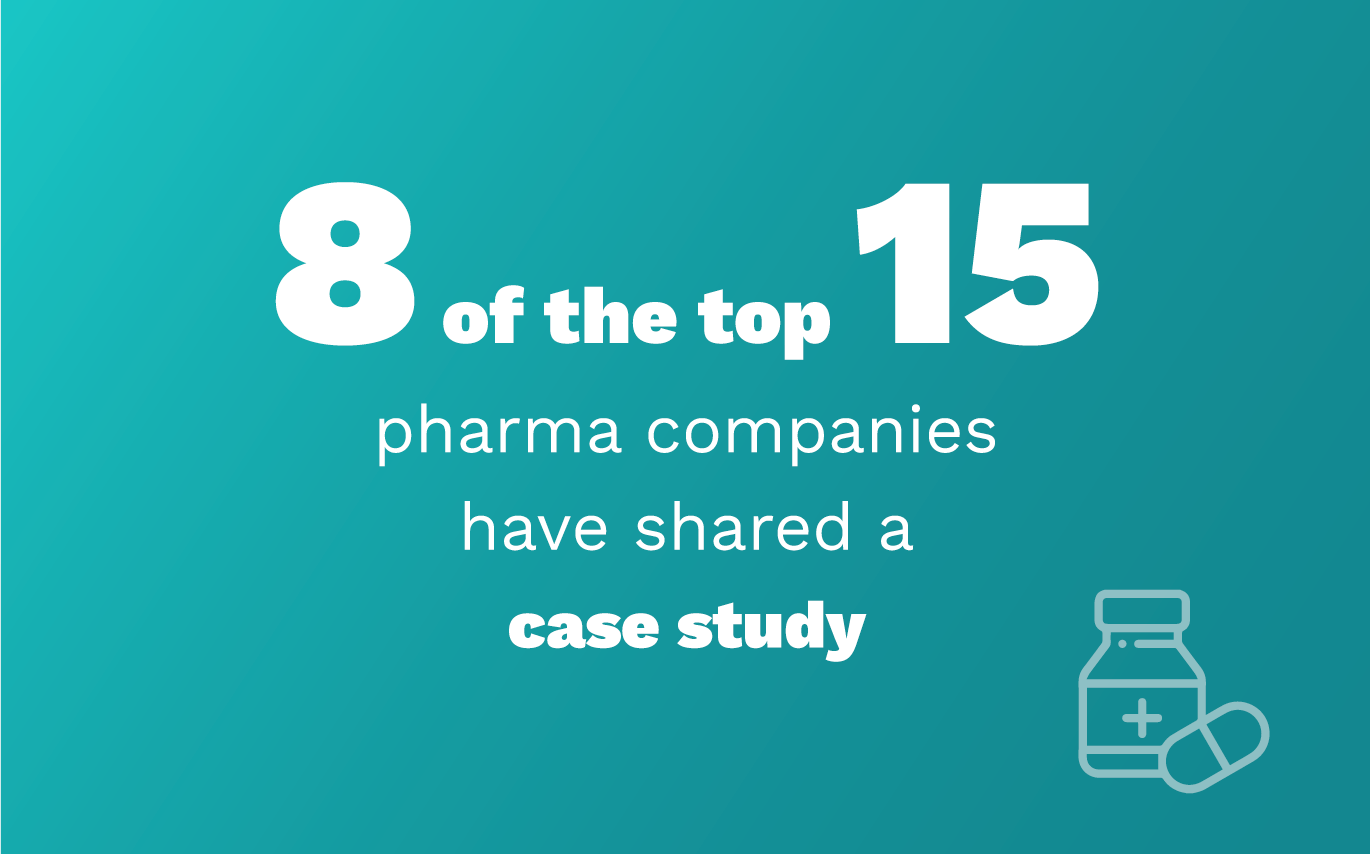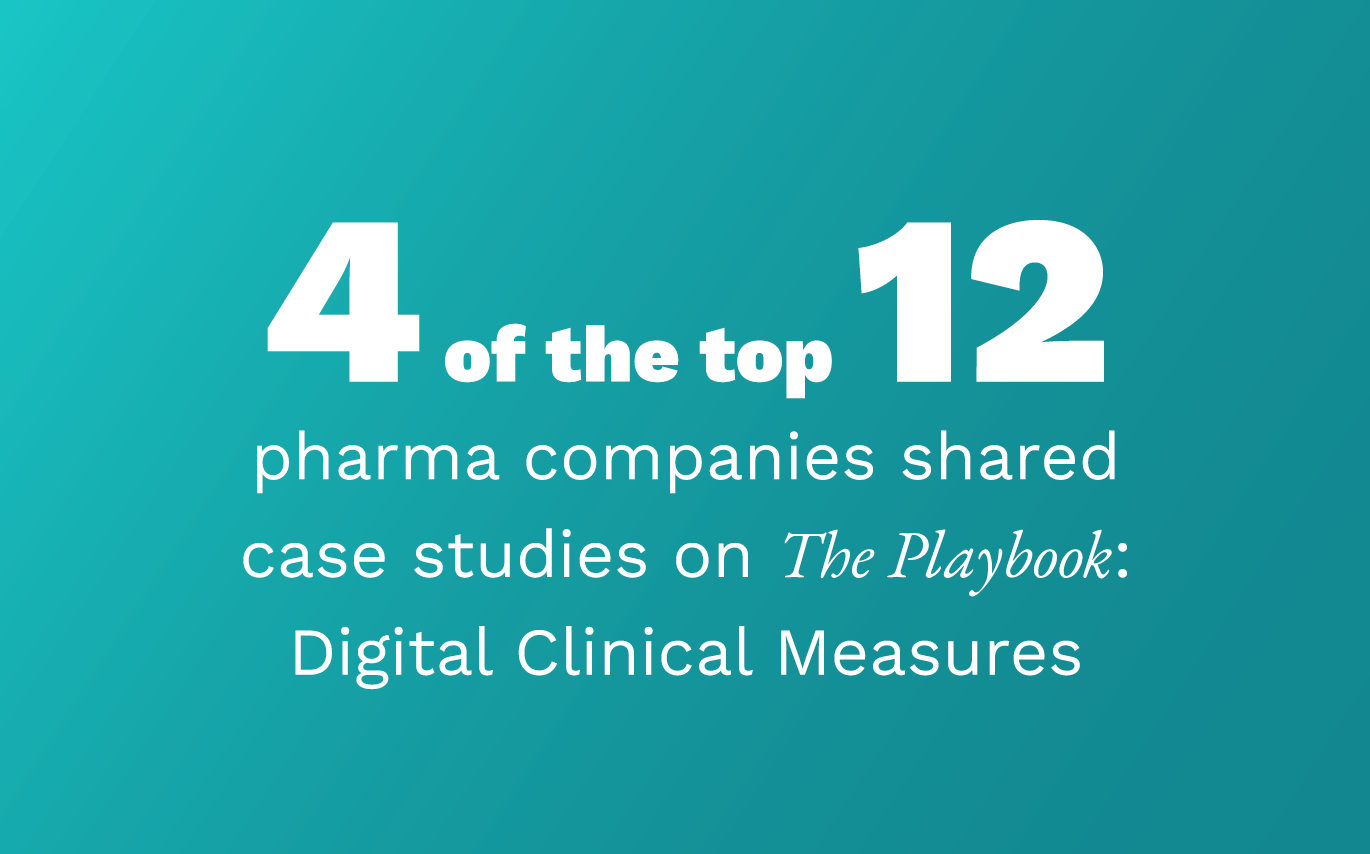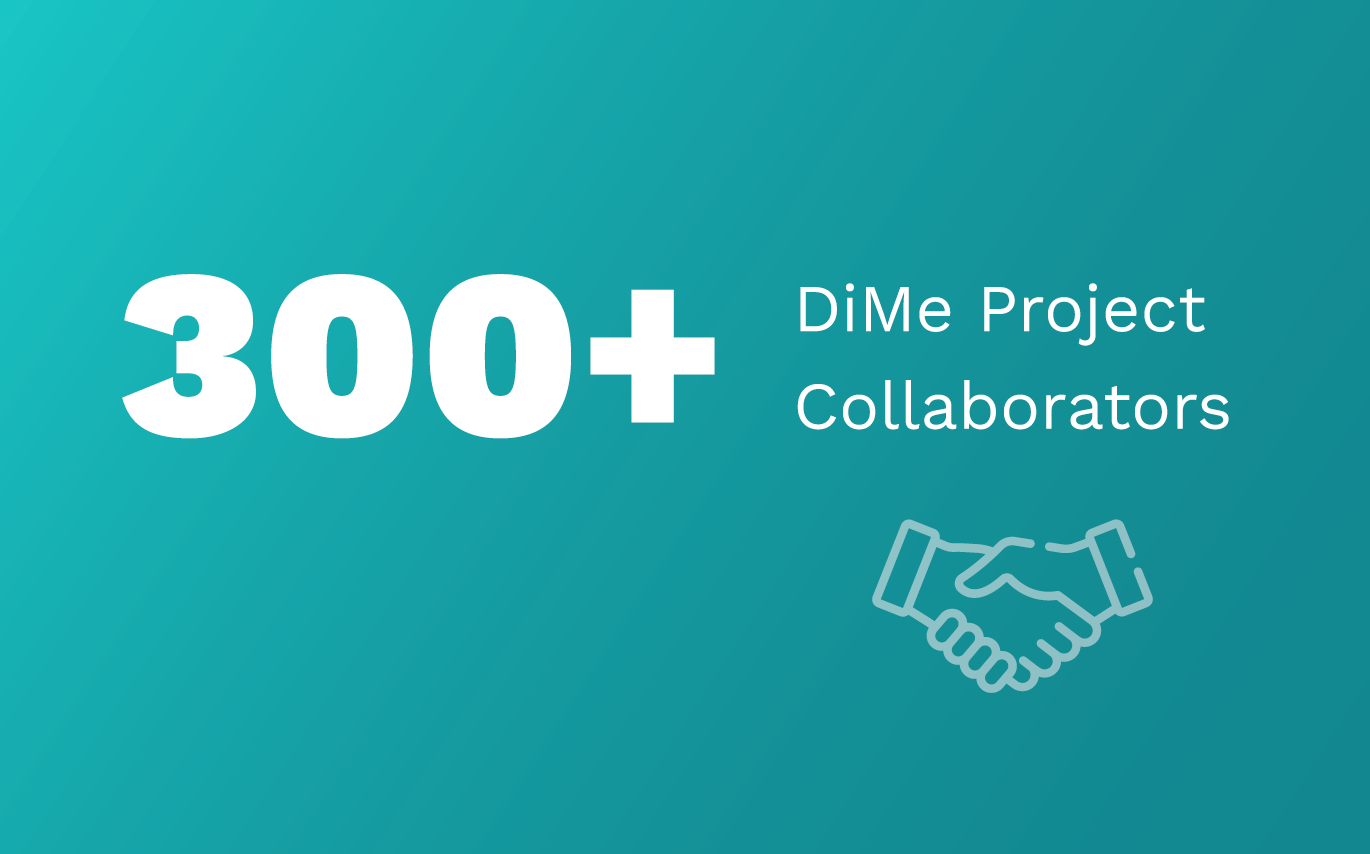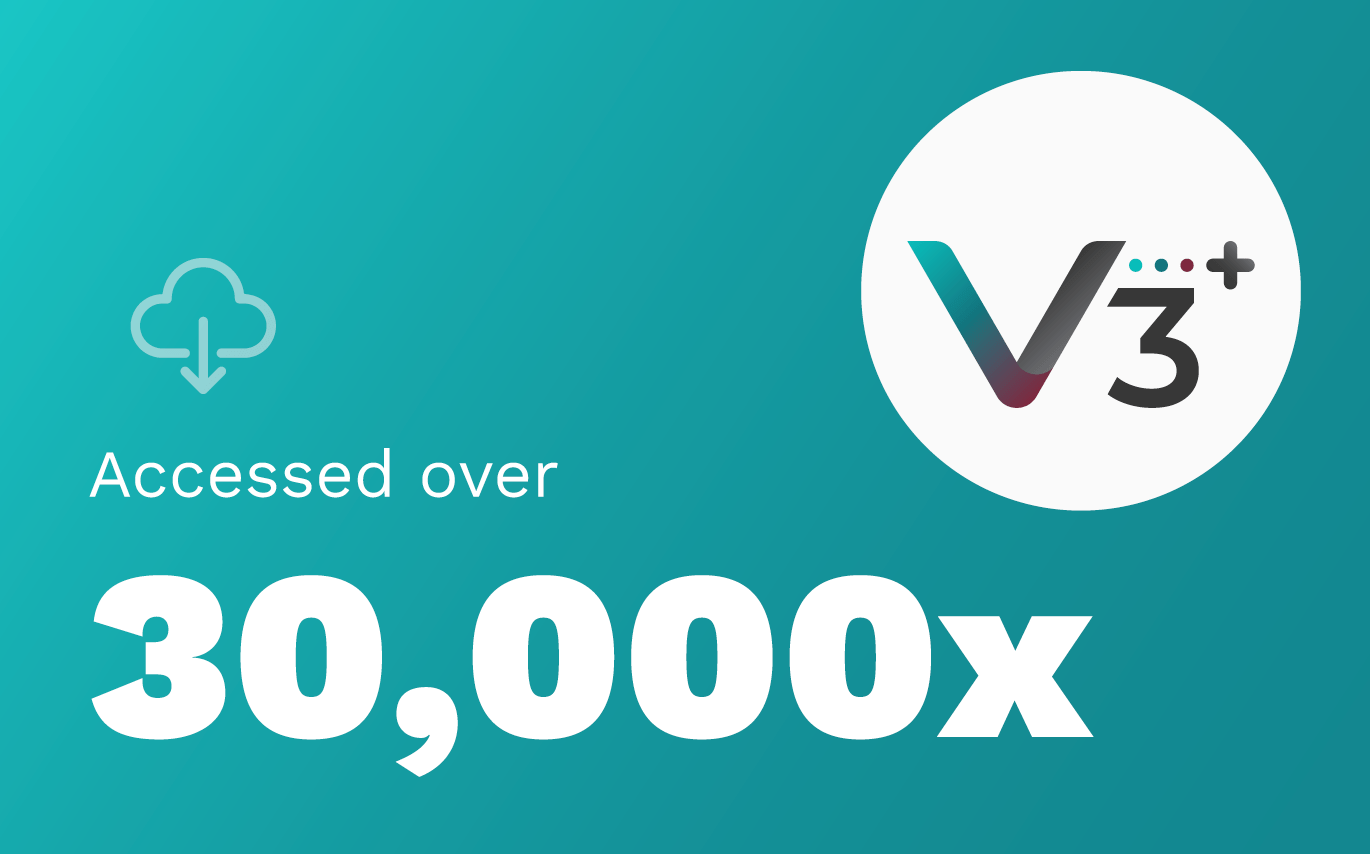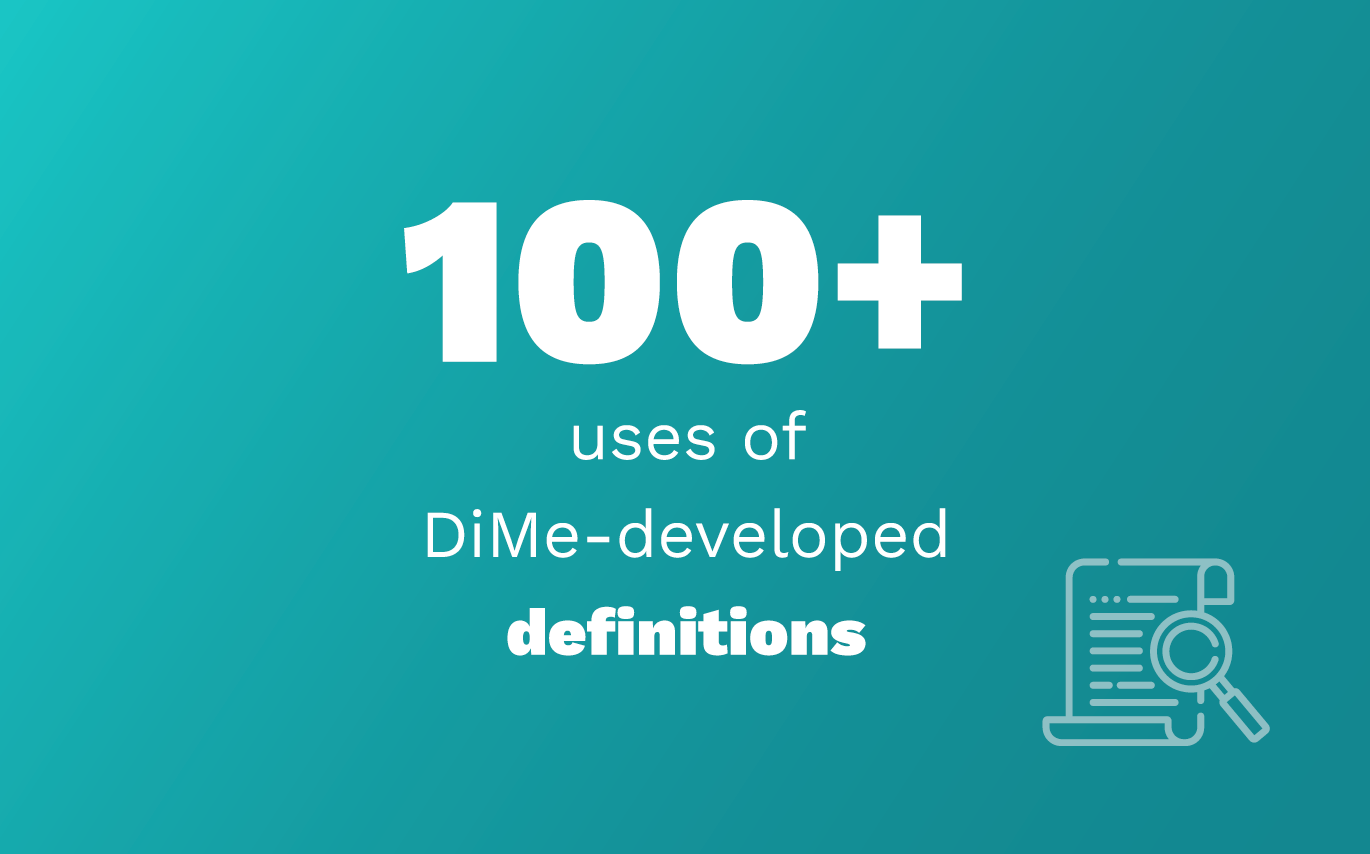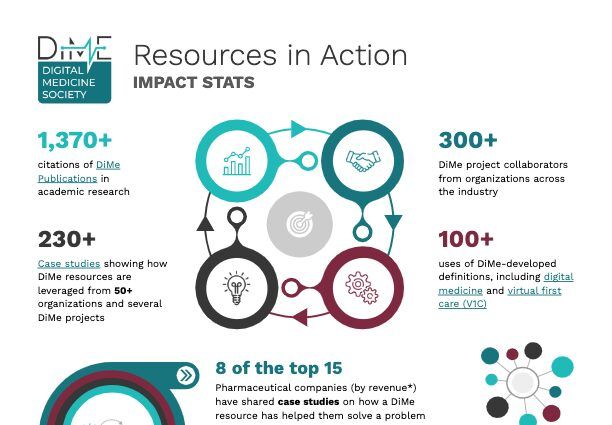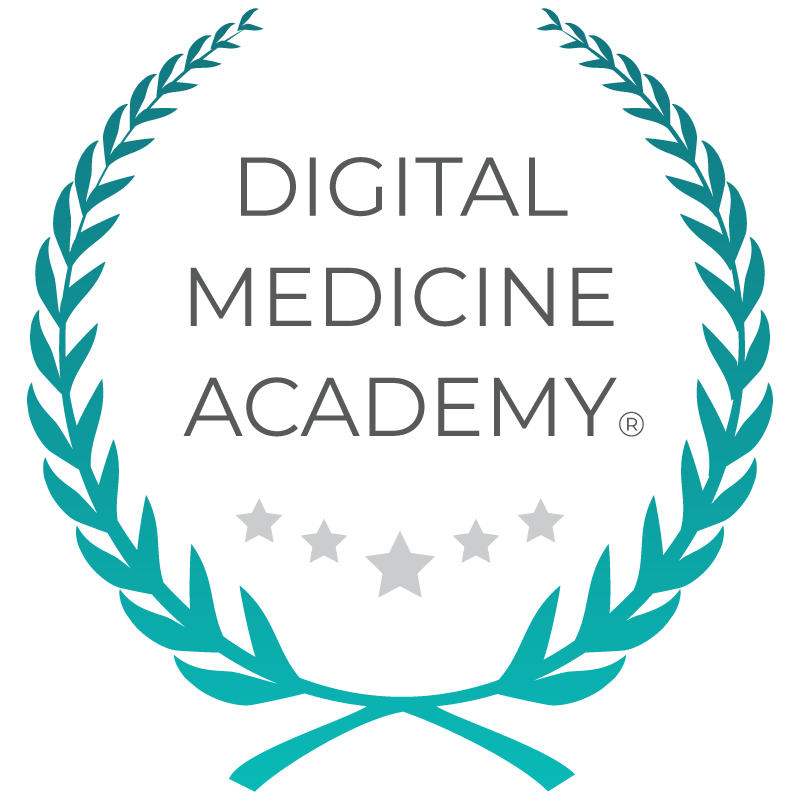
Resources in Action Hub
Learn how DiMe resources position our community to redefine healthcare and improve lives
DiMe’s Resources in Action Hub spotlights how leaders, innovators, and digital enthusiasts use DiMe’s work to advance the use of digital medicine to redefine healthcare and improve lives.
Browse our Hub to learn about the:

DiMe’s Impact by the Numbers
Last updated August 14, 2024
DiMe Case Studies
DiMe’s case hub spotlights how teams drive impact using DiMe resources in their work. Browse the cases from leaders in the field below and to learn how you can start leveraging DiMe resources in action today.
-
Resource
- 3Ps
- Alzheimer’s Disease and Related Dementias
- Applied Digital Health Ethics
- Building Fit-for-Purpose Sensor-based Digital Health Technologies: A Crash Course
- Business Case
- CRS
- CancerX
- Connected Health Collaborative Community
- Core Measures of Physical Activity
- Core Measures of Sleep
- DATAcc
- DE&I in Digitized Clinical Trial
- DiMe Community
- Digital Health Regulatory Pathways
- Digital Measures for Parkinson’s Disease
- Evidence Checklist
- Fast Track to Digital Clinical Trials for Pharma
- Health AI Essentials: A primer for aspiring AI champions in low-resource healthcare settings
- Hospital-at-Home
- Integrated Evidence Plan
- International Regulatory Pathways
- Library of Digital Endpoints
- Measures that Matter
- Nocturnal Scratch
- Opioid Use Disorder
- Regulatory Path
- Sensor Data Integrations
- Sleep
- The Playbook-Digital Clinical Measures
- The Playbook-Digital Healthcare Edition
- The Playbook: Digital Clinical Measures
- The Playbook: Implementing AI in Healthcare
- The Playbook: Pediatric Digital Medicine
- The Primer
- Unlocking Regulatory Success for Digital Health Product Developers
- V3
- V3+
- Validating Novel Digital Clinical Measures
- Value-based Framework
- Virtual First Care Coalition
-
Organization
- AARDEX
- AbbVie
- Abridge
- Acclinate
- ActiGraph
- Activinsights
- Aetna
- Alcohol and Drug Services (ADS)
- AliveCor
- Althea.ai
- Altoida
- American Academy of Pediatrics
- American College of Cardiology (ACC)
- American Heart Association
- American Kidney Fund
- American Physical Therapy Association
- Amwell
- Analog Devices Inc.
- AposHealth
- Aptar Digital Health
- Arrive Health and Artium
- Astellas Pharma
- Atrium Health
- Aural Analytics
- BD
- BIG IDEAs Lab
- Bayer
- Beacon Biosignals
- Biofourmis
- Biofourmis and HealthXL
- Biogen
- Blue Spark
- Boston Children’s Hospital
- Boston University
- Bristol Myers Squibb
- Byteflies
- CHAI
- Cambridge Cognition
- Cancer Support Community
- Canopy
- Caption Health
- CareHive
- Carey
- Charlie Health
- Children’s Mercy Hospital
- Cincinnati Children’s Hospital Medical Center
- Clario
- Cleveland Clinic Children’s
- Clinical Trials Transformation Initiative
- Cogniant
- Community Health Center
- Consumer Technology Association
- Cover
- Critical Path
- Curai Health
- DiMe Academy Testimonial
- DiMe Community
- DiMe Project
- DiMe Research Committee
- Diagnostikare
- Digital Medicine Coding Committee
- Digital Therapeutics Alliance
- Dreem
- Duke
- Duke Health
- Duke University
- EMA
- Elevance Health
- Eli Lilly
- Empatica
- Evidation
- Evinova
- FDA
- Family Health Centers of San Diego
- Feel Therapeutics
- Florida Cancer Specialist
- Freespira
- GSK
- Gabi SmartCare
- Genentech
- Gilead
- Hamburg University of Technology
- Hasso Plattner Institute
- Health Advances
- HealthAdvances and DTX
- HealthXL
- Healthy Northeast Ohio
- Heartbeat Health
- HumanFirst
- IQVIA
- ISHI Health
- Inlightened
- Institute for eHealth Equity
- Intelligent Futures Research Lab (IFRL) at Nationwide Children’s Hospital (NCH)
- Intelligent Product Solutions
- Intellihealth
- Janssen
- Jazz Pharmaceuticals
- Johns Hopkins
- KELLS
- Ki:elements
- Koios
- Koneksa
- Labcorp
- Lightship
- Lunit
- Massachusetts General Hospital
- Medable
- Medical Device and Technology
- Medically Home
- Medidata
- Mercer
- Merck
- Michael J. Fox Foundation
- Mix Talent
- Modality.AI
- Morse Clinic of Zebulon
- NPAF
- National Digital Inclusion Alliance
- National Institutes of Health
- Nestlé
- Newfund
- NextSense
- Northwestern University
- Omada
- Onduo
- Open mHealth
- Ophelia
- Oshi Health
- Pfizer
- Project Sleep
- ProofPilot
- Protokinetics
- Public Health Innovators
- Rand Corporation
- Research Publication
- Reveles
- Roche
- Rock Health
- Rubix LS
- Sage Bionetworks
- Servier
- Sharecare
- Shimmer Americas
- Sibel Health
- Siemens Healthineers
- Silicon Labs
- SimpliFed
- Stanford Medicine
- Stanford University School of Medicine
- Stats-of-1
- Stel Life
- Strados Labs
- Sysnav Healthcare
- TNO
- Takeda
- Tatvacare
- Tech4Pets
- Teladoc
- Tele911
- The American College of Cardiology
- The Stem
- The White House
- Thirty Madison
- Tidepool
- Touch BBCA
- Triangle CERSI
- Tufts Center for the Study of Drug Development
- Tuzag
- UCB
- UMass Chan Medical School
- USC College of Pharmacy
- VA
- VHA
- Vanderbilt University Medical Center
- Verily
- Veterans Health Administration
- Visana Health
- VivoSense
- WKD.SMRT
- Wellinks
- Winterlight
- ZS
- Zipnosis
- Zivian
- Zus
- b.well
- dentistry.one
- physIQ
- ŌURA

Anabella Aspiras, The White House, expresses her excitement about CancerX’s launch of navigation resources and its impact on the health system’s ability to provide scaled and sustainable patient navigation. These efforts are needed to ensure equitable access, adoption, and availability of high-quality navigation services.

Danielle Brown, Florida Cancer Specialist, elaborates on how CancerX’s navigation resources have helped to address and reduce barriers to care. She particularly praises the ROI tool that she was able to test, stating that it helped tell the story of what an organization needs and what the ROI can be.
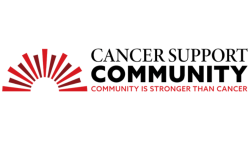
Cate O’Reilly, Cancer Support Community, explains how CancerX’s Digitally Enabled Patient Navigation Blueprint can impact patient and healthcare outcomes, help providers identify and articulate needs, and provide on-demand patient support.
Steve Xu praises DiMe for thinking about how words and definitions matter in relation to scratch. To better understand what scratch means, knowing the many different ways to talk about it and having this specificity is important.
Steve Xu appreciates DiMe’s work on ontology, frameworks, and definitions because it directly leads to outcomes, measurements, and technologies. Those tools can be put in front of regulators, which leads to the correct levels of clinical validation and acceptance.

“The V3 Testing within the DATAcc Toolkit for Development… is where my team in our trying to bring precision health to everyone is building devices and tools that let us generate objective real-world evidence… this is why I love this framing.” – Kristin Size, Head of Study Devices, Verily
-
Resource
- 3Ps
- Alzheimer’s Disease and Related Dementias
- Applied Digital Health Ethics
- Building Fit-for-Purpose Sensor-based Digital Health Technologies: A Crash Course
- Business Case
- CRS
- CancerX
- Connected Health Collaborative Community
- Core Measures of Physical Activity
- Core Measures of Sleep
- DATAcc
- DE&I in Digitized Clinical Trial
- DiMe Community
- Digital Health Regulatory Pathways
- Digital Measures for Parkinson’s Disease
- Evidence Checklist
- Fast Track to Digital Clinical Trials for Pharma
- Health AI Essentials: A primer for aspiring AI champions in low-resource healthcare settings
- Hospital-at-Home
- Integrated Evidence Plan
- International Regulatory Pathways
- Library of Digital Endpoints
- Measures that Matter
- Nocturnal Scratch
- Opioid Use Disorder
- Regulatory Path
- Sensor Data Integrations
- Sleep
- The Playbook-Digital Clinical Measures
- The Playbook-Digital Healthcare Edition
- The Playbook: Digital Clinical Measures
- The Playbook: Implementing AI in Healthcare
- The Playbook: Pediatric Digital Medicine
- The Primer
- Unlocking Regulatory Success for Digital Health Product Developers
- V3
- V3+
- Validating Novel Digital Clinical Measures
- Value-based Framework
- Virtual First Care Coalition
-
Organization
- AARDEX
- AbbVie
- Abridge
- Acclinate
- ActiGraph
- Activinsights
- Aetna
- Alcohol and Drug Services (ADS)
- AliveCor
- Althea.ai
- Altoida
- American Academy of Pediatrics
- American College of Cardiology (ACC)
- American Heart Association
- American Kidney Fund
- American Physical Therapy Association
- Amwell
- Analog Devices Inc.
- AposHealth
- Aptar Digital Health
- Arrive Health and Artium
- Astellas Pharma
- Atrium Health
- Aural Analytics
- BD
- BIG IDEAs Lab
- Bayer
- Beacon Biosignals
- Biofourmis
- Biofourmis and HealthXL
- Biogen
- Blue Spark
- Boston Children’s Hospital
- Boston University
- Bristol Myers Squibb
- Byteflies
- CHAI
- Cambridge Cognition
- Cancer Support Community
- Canopy
- Caption Health
- CareHive
- Carey
- Charlie Health
- Children’s Mercy Hospital
- Cincinnati Children’s Hospital Medical Center
- Clario
- Cleveland Clinic Children’s
- Clinical Trials Transformation Initiative
- Cogniant
- Community Health Center
- Consumer Technology Association
- Cover
- Critical Path
- Curai Health
- DiMe Academy Testimonial
- DiMe Community
- DiMe Project
- DiMe Research Committee
- Diagnostikare
- Digital Medicine Coding Committee
- Digital Therapeutics Alliance
- Dreem
- Duke
- Duke Health
- Duke University
- EMA
- Elevance Health
- Eli Lilly
- Empatica
- Evidation
- Evinova
- FDA
- Family Health Centers of San Diego
- Feel Therapeutics
- Florida Cancer Specialist
- Freespira
- GSK
- Gabi SmartCare
- Genentech
- Gilead
- Hamburg University of Technology
- Hasso Plattner Institute
- Health Advances
- HealthAdvances and DTX
- HealthXL
- Healthy Northeast Ohio
- Heartbeat Health
- HumanFirst
- IQVIA
- ISHI Health
- Inlightened
- Institute for eHealth Equity
- Intelligent Futures Research Lab (IFRL) at Nationwide Children’s Hospital (NCH)
- Intelligent Product Solutions
- Intellihealth
- Janssen
- Jazz Pharmaceuticals
- Johns Hopkins
- KELLS
- Ki:elements
- Koios
- Koneksa
- Labcorp
- Lightship
- Lunit
- Massachusetts General Hospital
- Medable
- Medical Device and Technology
- Medically Home
- Medidata
- Mercer
- Merck
- Michael J. Fox Foundation
- Mix Talent
- Modality.AI
- Morse Clinic of Zebulon
- NPAF
- National Digital Inclusion Alliance
- National Institutes of Health
- Nestlé
- Newfund
- NextSense
- Northwestern University
- Omada
- Onduo
- Open mHealth
- Ophelia
- Oshi Health
- Pfizer
- Project Sleep
- ProofPilot
- Protokinetics
- Public Health Innovators
- Rand Corporation
- Research Publication
- Reveles
- Roche
- Rock Health
- Rubix LS
- Sage Bionetworks
- Servier
- Sharecare
- Shimmer Americas
- Sibel Health
- Siemens Healthineers
- Silicon Labs
- SimpliFed
- Stanford Medicine
- Stanford University School of Medicine
- Stats-of-1
- Stel Life
- Strados Labs
- Sysnav Healthcare
- TNO
- Takeda
- Tatvacare
- Tech4Pets
- Teladoc
- Tele911
- The American College of Cardiology
- The Stem
- The White House
- Thirty Madison
- Tidepool
- Touch BBCA
- Triangle CERSI
- Tufts Center for the Study of Drug Development
- Tuzag
- UCB
- UMass Chan Medical School
- USC College of Pharmacy
- VA
- VHA
- Vanderbilt University Medical Center
- Verily
- Veterans Health Administration
- Visana Health
- VivoSense
- WKD.SMRT
- Wellinks
- Winterlight
- ZS
- Zipnosis
- Zivian
- Zus
- b.well
- dentistry.one
- physIQ
- ŌURA

Anabella Aspiras, The White House, expresses her excitement about CancerX’s launch of navigation resources and its impact on the health system’s ability to provide scaled and sustainable patient navigation. These efforts are needed to ensure equitable access, adoption, and availability of high-quality navigation services.

Danielle Brown, Florida Cancer Specialist, elaborates on how CancerX’s navigation resources have helped to address and reduce barriers to care. She particularly praises the ROI tool that she was able to test, stating that it helped tell the story of what an organization needs and what the ROI can be.

Cate O’Reilly, Cancer Support Community, explains how CancerX’s Digitally Enabled Patient Navigation Blueprint can impact patient and healthcare outcomes, help providers identify and articulate needs, and provide on-demand patient support.
Steve Xu praises DiMe for thinking about how words and definitions matter in relation to scratch. To better understand what scratch means, knowing the many different ways to talk about it and having this specificity is important.
Steve Xu appreciates DiMe’s work on ontology, frameworks, and definitions because it directly leads to outcomes, measurements, and technologies. Those tools can be put in front of regulators, which leads to the correct levels of clinical validation and acceptance.

“The V3 Testing within the DATAcc Toolkit for Development… is where my team in our trying to bring precision health to everyone is building devices and tools that let us generate objective real-world evidence… this is why I love this framing.” – Kristin Size, Head of Study Devices, Verily
